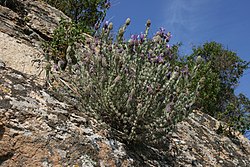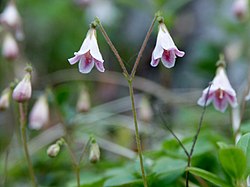Our website is made possible by displaying online advertisements to our visitors.
Please consider supporting us by disabling your ad blocker.
Subshrub


A subshrub (Latin suffrutex) or undershrub is either a small shrub (e.g. prostrate shrubs) or a perennial that is largely herbaceous but slightly woody at the base (e.g. garden pink and florist's chrysanthemum).[1] The term is often interchangeable with "bush".[2]
Because the criteria are matters of degree (normally of height) rather than of kind, the definition of a subshrub is not sharply distinguishable from that of a shrub; examples of reasons for describing plants as subshrubs include ground-hugging stems or low growth habit. Subshrubs may be largely herbaceous though still classified as woody, with overwintering perennial woody growth much lower-growing than deciduous summer growth. Some plants described as subshrubs are only weakly woody and some persist for only a few years. Others, such as Oldenburgia paradoxa live indefinitely (though is still vulnerable to external effects), rooted in rocky cracks.
Small, low shrubs such as lavender, periwinkle, and thyme, and many shrub-like members of the family Ericaceae, such as cranberries and small species of Erica, are often classed as subshrubs.
- ^ Harris, James G.; Harris, Melinda Woolf (2001). Plant identification terminology: an illustrated glossary (2nd ed.). Spring Lake, Utah: Spring Lake Publishing. p. 117.
- ^ Jackson, Benjamin, Daydon; A Glossary of Botanic Terms with their Derivation and Accent; Published by Gerald Duckworth & Co. London, 4th ed 1928
Previous Page Next Page


